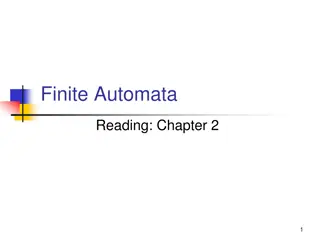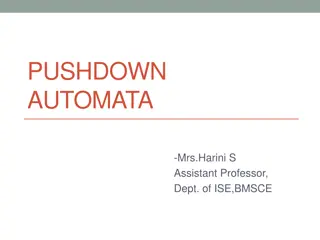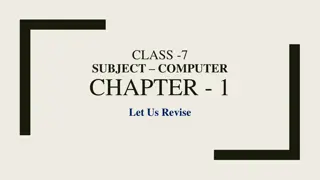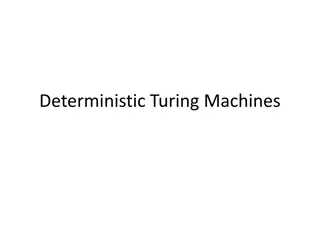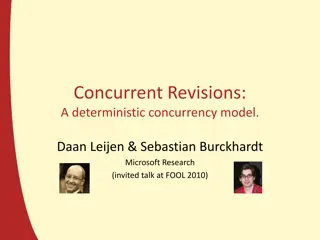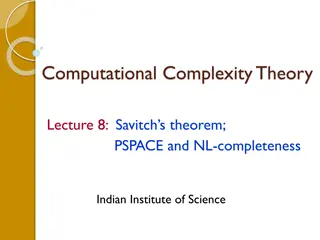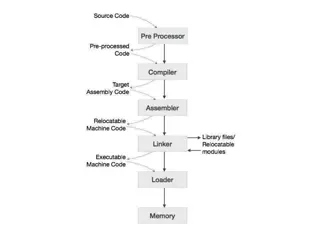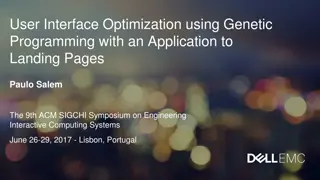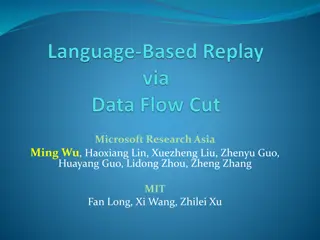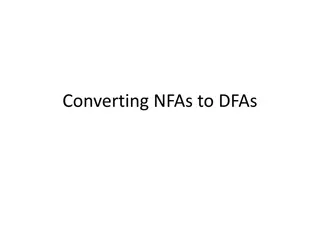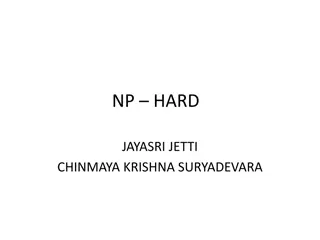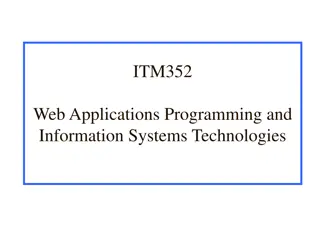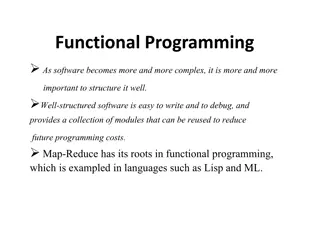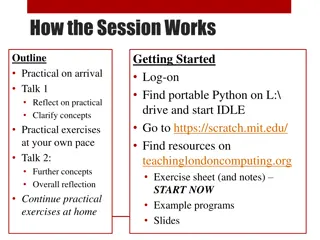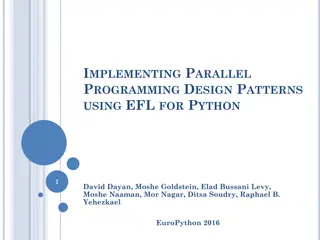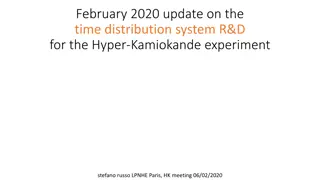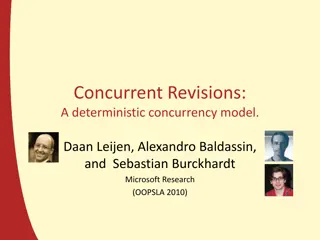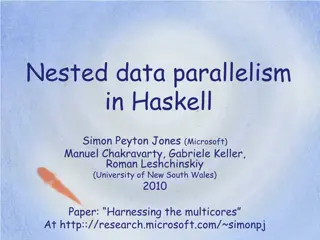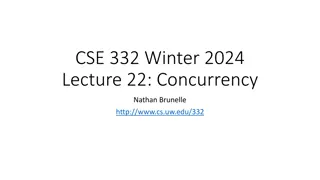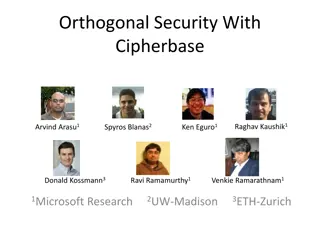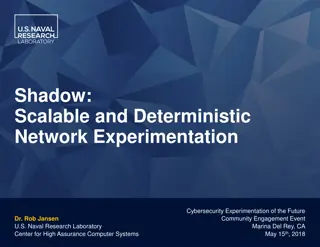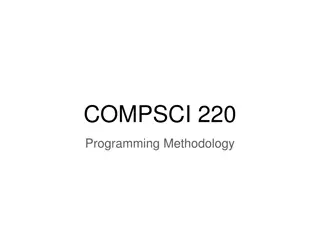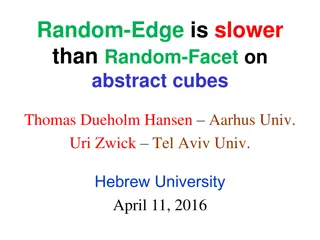Functional Programming
Functional programming, a paradigm that emphasizes declarative programming, pure functions, and limited side effects. Explore the benefits and characteristics of functional programming languages.
0 views • 20 slides
Approaches in Studying Human-Environment Relationship
Explore different approaches to understanding the dynamic relationship between humans and their environment, including deterministic, teleological, possibilistic, and economic deterministic perspectives. These approaches shed light on how human actions and interactions with the environment have evol
1 views • 9 slides
Decision Analysis and Operations Research in Management
This content delves into Management Decision Analysis and Operations Research techniques such as Linear Programming, Integer Linear Programming, Dynamic Programming, Nonlinear Programming, and Network Programming. It covers the phases of an Operations Research study, mathematical modeling for decisi
0 views • 36 slides
Understanding Deterministic Finite Automata (DFA) in Regular Language Theory
An exploration of Deterministic Finite Automata (DFA) in the context of Regular Languages, covering their definition, functioning, application in recognizing input strings, and building a DFA for a specific language. The Chomsky Hierarchy and the significance of Regular Languages are also briefly di
0 views • 41 slides
Understanding Pushdown Automata and Language Acceptance
Pushdown Automata (PDA) provide a theoretical framework for recognizing context-free languages. In PDA, the acceptance of a language depends on reaching a final state or having an empty stack. This concept is illustrated through examples and the distinction between deterministic and non-deterministi
0 views • 10 slides
Module 2: PSEA and Safe Programming Training of Trainers (ToT) by CRS HRD
This Module 2 focuses on PSEA and Safe Programming, covering key sessions on understanding safe programming, identifying protection and SEA risks, and mitigating risks. It emphasizes the importance of safe programming in increasing safety, dignity, and access, with staff playing a crucial role. Part
2 views • 19 slides
Understanding Computer Programming: Basics and Beyond
In this chapter, we delve into the fundamental concepts of computer programming. We explore the definition of a program, the role of programming languages, types of programming languages, and generations of programming languages. Additionally, an assignment is provided to reinforce the key learnings
0 views • 25 slides
Understanding Deterministic Turing Machines
Detailed explanation of Deterministic Turing Machines, their constituents, formal definition, determinism, and special statuses such as Start, Accept, Reject, and Loop. Includes visual representations and key concepts of deterministic Turing machines.
0 views • 14 slides
Understanding Object-Oriented Programming (OOP) in Python
Python is a versatile programming language that supports various programming approaches. Object-Oriented Programming (OOP) is a popular method in Python where objects are created to solve programming problems. OOP in Python focuses on creating reusable code, following the principle of DRY (Don't Rep
1 views • 35 slides
Introduction to Computers and C++ Programming Lecture 1 - Overview and Basics
This lecture covers the fundamental concepts in computer systems and programming using C++. Topics include the main components of a computer, bytes and addresses in memory, computer systems hardware and software, understanding programs, programming languages, compilers, preparing and running C++ pro
1 views • 21 slides
Web Application Development and Programming CTE Program Overview
Viera High School offers a comprehensive CTE program in Web Application Development and Programming, taught by Mr. Dohmen. Students learn popular programming languages like Python, SQL, JavaScript, Java, C#, and C. The courses cover web programming, JavaScripting, and PHP programming, providing cert
1 views • 7 slides
Introduction to Programming with RobotC in Robotics Education
Programming in robotics involves giving specific directions to a robot using software like RobotC. This introduction covers the basics of programming, software organization, and how to get started with RobotC through creating flow charts and programming tasks. Learn about setting up RobotC, creating
0 views • 8 slides
Introduction to Programming and Computer Instructions
Programming is the process of creating instructions for computers to follow and accomplish tasks. It involves turning human language instructions into detailed binary machine language. Before learning programming, individuals may have different levels of experience, ranging from no experience to pro
0 views • 16 slides
Concurrent Revisions: A Deterministic Concurrency Model
Exploring a deterministic concurrency model proposed by Daan Leijen and Sebastian Burckhardt, focusing on concurrent programming, threads, locks, futures, promises, transactions, and the resolution of conflicts in parallel performance.
0 views • 36 slides
Overview of Computational Complexity Theory: Savitch's Theorem, PSPACE, and NL-Completeness
This lecture delves into Savitch's theorem, the complexity classes PSPACE and NL, and their completeness. It explores the relationship between time and space complexity, configuration graphs of Turing machines, and how non-deterministic space relates to deterministic time. The concept of configurati
0 views • 67 slides
Development of Attosecond Theory for Nobel Prize through Verilog Programming
Attosecond generation is a crucial technique for creating attosecond pulses by manipulating radiation waves. This research paper focuses on developing the Attosecond generation equation through Verilog programming and validating it using test programming techniques. The interface between equations,
0 views • 15 slides
Understanding Issues in Context-Free Grammar: Ambiguity, Precedence, Associativity, and More
Delve into the complexities of context-free grammar, exploring concepts such as ambiguity, precedence, associativity, left recursion, and left factoring. Learn about the challenges posed by left recursion and the differences between ambiguous and unambiguous, as well as deterministic and non-determi
0 views • 7 slides
Genetic Programming for User Interface Optimization at EICS 2017
Proposal by Paulo Salem at EICS 2017 introduces Genetic Programming for optimizing user interfaces, addressing limitations of existing solutions. The approach utilizes programmatic specifications, structured representations, and non-deterministic choices to evolve UIs efficiently.
0 views • 18 slides
CS252 Systems Programming Course Overview
This course overview covers topics such as C programming review, Unix basics, Unix systems programming, and grading details. The course includes labs on C/C++ programming, Unix shell scripting, and writing your own shell. Communication is emphasized through Piazza for questions/answers and Blackboar
0 views • 41 slides
Enhancing Replay Interface Efficiency in System Debugging
Efforts by researchers at Microsoft Research Asia and MIT focus on enhancing replay interface efficiency for system debugging. The motivation stems from the non-determinism challenges caused by time, user input, network I/O, and thread interleaving. The study observes that only certain parts of a pr
0 views • 26 slides
Compiler Data Structures and NFA to DFA Conversion
Compiler data structures play a crucial role in the compilation process, handling lexical analysis to code generation. Understanding the conversion from non-deterministic finite automata (NFA) to deterministic finite automata (DFA) is essential for efficient language processing and optimization.
0 views • 10 slides
Understanding P vs. NP: A Comprehensive Overview
Delve into the complexities of computational problem-solving with insights on P, NP, NP-complete, determinism, and non-determinism. Explore the distinctions between deterministic and non-deterministic algorithms and the implications they have on problem-solving capabilities. Gain a deeper understand
0 views • 22 slides
Introduction to Programming Languages and Functional Programming with OCaml
Welcome to Lecture 1 of CSEP505 on Programming Languages focusing on OCaml and functional programming. Professor Dan Grossman introduces the course, discusses the importance of studying programming languages, and shares insights on course mechanics and content. Topics include staff introductions, co
0 views • 84 slides
Understanding ITM352 and Its Role in MIS
Welcome to ITM352, a course focusing on acquiring basic programming skills in a business context. This course emphasizes hands-on experience in developing relevant software applications, addressing real technology problems, and fostering rapid self-learning of IS/IT technologies. Misconceptions arou
0 views • 36 slides
Understanding Functional Programming Paradigm
Functional programming emphasizes well-structured software that is easy to write and debug, with reusable modules to reduce future programming costs. It introduces higher-order functions and first-class function values, fostering declarative programming for tasks like symbolic data manipulation and
0 views • 21 slides
Essential Principles of Teaching Programming Languages
Foundational concepts in programming form the core of computing. This encompasses understanding programming fundamentals, teaching language aspects effectively, statistical programming for data analysis, and guiding students unfamiliar with programming environments towards grasping the logic and sim
0 views • 23 slides
Exploring Computer Programming Principles
Dive into the world of computer programming, covering high-level and machine languages, compilers, interpreters, writing programs, top-down design, and the array of programming languages available. Understand the essentials of building code to control computers, the diversity of programming language
0 views • 23 slides
Transitioning from Scratch to Python: A Practical Approach for Learning Textual Programming
Explore the transition from visual programming in Scratch to textual programming in Python using Turtle Graphics. Engage in practical exercises, clarify key concepts, and reflect on the challenges and progress in learning core programming concepts. Utilize resources from TeachingLondon Computing to
0 views • 21 slides
Implementing Parallel Programming Design Patterns Using EFL for Python
This presentation explores the motivation and objectives behind developing a common parallel programming approach, introducing the Embedded Flexible Language (EFL) for Python. The EFL programming model allows for a straightforward implementation of sequential and parallel executions to produce deter
0 views • 49 slides
Systematic Testing of Reactive Software - A Case Study on LG Electric Oven
Overview of a case study conducted on LG Electric Oven using systematic testing of reactive software with non-deterministic events. The study focused on detecting concurrency bugs in the software controller of the oven through an automated testing framework that generates event timing sequences. It
0 views • 32 slides
Understanding Cross-Device Tracking for Better Engagement
Delve into the world of cross-device tracking with insights on probabilistic vs. deterministic matching models, limitations of third-party cookies, reasons to engage in cross-device tracking, and the distinctions between probabilistic and deterministic matching methods. Explore how tracking across m
0 views • 41 slides
Time Distribution System R&D Update for Hyper-Kamiokande Experiment
In the February 2020 update, Stefano Russo from LPNHE Paris presented the progress on the time distribution system R&D for the Hyper-Kamiokande experiment. The focus is on implementing a bidirectional data exchange link with a large bandwidth capacity for synchronous, phase-deterministic protocol. T
0 views • 17 slides
Concurrent Revisions: A Model for Deterministic Concurrency
This content discusses a deterministic concurrency model called Concurrent Revisions, focusing on interactive applications with large shared data structures. It covers the challenges of conflicting tasks, conventional concurrency control methods, and proposes a programming model based on revisions a
0 views • 41 slides
Overview of Nested Data Parallelism in Haskell
The paper by Simon Peyton Jones, Manuel Chakravarty, Gabriele Keller, and Roman Leshchinskiy explores nested data parallelism in Haskell, focusing on harnessing multicore processors. It discusses the challenges of parallel programming, comparing sequential and parallel computational fabrics. The evo
0 views • 55 slides
Concurrency and Memory Sharing in Java Programming
Understanding concurrency and memory sharing in Java programming is crucial for managing shared resources efficiently. This includes concepts like ForkJoin, shared queues, and synchronized situations in examples like bank accounts. Proper synchronization is essential to prevent simultaneous access i
0 views • 59 slides
CS 288-102 Intensive Programming in Linux Spring 2017 Course Details
Learn Linux programming, C language proficiency, Bash scripting, and more in this intensive course taught by Instructor C.F. Yurkoski. The course covers programming in Linux environment, command line interface, C language, client/server programming, and essential programming concepts like pointers,
0 views • 31 slides
Ensuring Orthogonal Security in Data Encryption Processes
Addressing the challenge of data confidentiality in untrusted server environments through the use of encryption techniques such as deterministic and non-deterministic encryption. The goal is to achieve full functionality independently of data encryption, allowing for secure processing of data querie
0 views • 21 slides
Shadow: Scalable and Deterministic Network Experimentation in Cybersecurity
The presentation discusses the concept of deterministic experimentation in cybersecurity, emphasizing the importance of experimental control and scalability in large distributed systems like Tor. It introduces Shadow, a network simulator designed to achieve repeatable and realistic experiments for r
0 views • 15 slides
Functional Programming Concepts for COMPSCI 220 Programming Methodology
In this tutorial, we explore functional programming concepts in the context of COMPSCI 220 Programming Methodology. We delve into writing functions using `reduce` and discuss examples and implementations of various functions like sum, product, and string length calculation. We also analyze the diffe
1 views • 47 slides
Insights on Linear Programming and Pivoting Rules in Optimization
Linear programming involves maximizing a linear objective function within a set of linear constraints to find the optimal point in a polytope. The simplex algorithm, introduced by Dantzig in 1947, navigates through vertices to reach the optimal solution. Deterministic and randomized pivoting rules,
0 views • 30 slides



